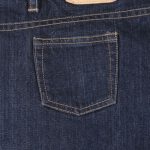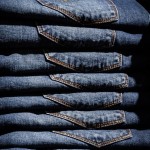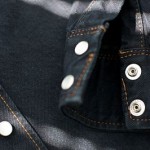When shopping for a new pair of jeans, you might be wondering whether to choose lightweight or denim. Jeans are available in lightweight and heavyweight denim. They are both made of the same warp-faced cotton textile. Lightweight jeans, however, weigh less than their heavyweight counterparts. So, should you choose lightweight jeans or heavyweight jeans? To answer this question, there are a few things you must know about lightweight and heavyweight jeans
The Basics of Denim Weight and What It Means
Jeans are often labeled with a specific weight. Measured in ounces (oz), it represents the weight of the denim from which they were made. Some jeans are labeled with “5 oz,” for instance, whereas others are labeled with “14 oz.”
The weight listed on these labels doesn’t represent the total weight of the jeans. Rather, it represents the weight of the denim. Jeans are made of denim, which is a warp-faced cotton textile. Some jeans are made of thicker, heavier denim than others.
Denim weight is per square yard. The listed weight, in other words, is multiplied by the total square yards used to produce the jeans. A typical pair of jeans is made of about one and a half to two square yards of denim. If the listed weight is 7 ounces, the total weight of the jeans will be about 10.5 to 14 ounces. Regardless, jeans are often labeled with a denim weight. The denim weight represents the per-square-yard weight of the denim from which the jeans were made.
What Are Lightweight Jeans?
Lightweight jeans are characterized by their use of lightweight denim. They are made of thinner, lighter denim than heavyweight jeans. While there’s no universal standard for lightweight jeans, they typically have a denim weight of 5 ounces to 9 ounces. This means lightweight jeans have a per-square-yard weight of about 5 to 9 ounces.
Lightweight jeans are made using the same production process as heavyweight jeans. They are made of denim, which is a cotton-based textile that involves passing the weft thread under two or more warp threads. Lightweight jeans are simply lightweight. The denim from which they are made has a weight of about 5 to 9 ounces per square yard.
What Are Heavyweight Jeans?
Heavyweight jeans, as you may have guessed, are characterized by their use of heavyweight denim. They are still made of denim, and they are available in many of the same cuts and styles as lightweight jeans. The difference, of course, is that heavyweight jeans are made of thicker and heavier denim than lightweight jeans.
Heavyweight jeans have a denim weight of about 10 to 16 ounces. They look like most other jeans. Based on their appearance alone, it’s difficult to distinguish between lightweight and heavyweight jeans. Nonetheless, heavyweight jeans are heavier than their lightweight counterparts. They are made of denim. The weight of this denim ranges from about 10 to 16 ounces on average.
With a higher per-square-yard weight, heavyweight jeans weigh more than lightweight jeans. They may weigh 20% to 50% more than lightweight jeans. It’s a noticeable difference that affects their properties in several ways.

Benefits of Lightweight Jeans
If you’re planning to wear them during the spring and summer months, you may want to choose lightweight jeans. Lightweight jeans are ideal during the warmer months of the year because of their thin and lightweight characteristics. They won’t leave you feeling hot. On the contrary, lightweight jeans will help to keep you cool. Thanks to their thin and lightweight characteristics, they will allow your body to breathe so that you don’t overheat even when it’s hot outside.
You may also want to choose lightweight jeans when working outdoors. Maybe you’re planning to mow the lawn, or perhaps you’re building an attached garage. Regardless, if you’re working outdoors, lightweight jeans are the way to go. They offer more freedom of mobility than their heavyweight counterparts. You’ll be able to bend and move your body more easily while wearing lightweight jeans.
A benefit of lightweight jeans that’s often overlooked is faster drying times. All jeans require washing. Whether you hand-wash them or machine-wash them, you’ll need to dry them afterward. Lightweight jeans dry more quickly than heavyweight jeans. You can dry them in just 10 minutes or less using a clothes dryer.
Benefits of Heavyweight Jeans
Heavyweight jeans are better suited for the cooler months of the year. They are thicker than lightweight jeans. With their thick and heavy construction, heavyweight jeans are warmer. They’ll trap more of your body heat so that you stay warm all winter long.
Longevity is another benefit of heavyweight jeans. All jeans are long-lasting. After all, they are made of denim, which is known for its superior durability. But heavyweight jeans still come out on top in terms of longevity. They are better protected against premature wear and tear than lightweight jeans. Lightweight jeans may develop signs of aging over time, but heavyweight jeans will retain their original appearance for many years when properly maintained.
Both lightweight and heavyweight jeans are available in different colors and styles. Some people prefer jeans in a traditional color like light blue or indigo. Other people prefer jeans in a more modern color like black or even green. Regardless, you can find lightweight and heavyweight jeans in different colors, and you can find them in many different styles.
Choosing Between Lightweight and Heavyweight Jeans
Now for the million-dollar question: Should you choose lightweight or heavyweight jeans? As you can see, each type offers its own unique benefits. Lightweight jeans are cool, offer more freedom of mobility and dry faster than heavyweight jeans. Heavyweight jeans, in comparison, are thicker, warmer and more durable than lightweight jeans.
You don’t have to choose between lightweight and heavyweight jeans. A better option is to include both types of jeans in your wardrobe. By investing in both types of jeans, you’ll be able to switch up your outfits.











